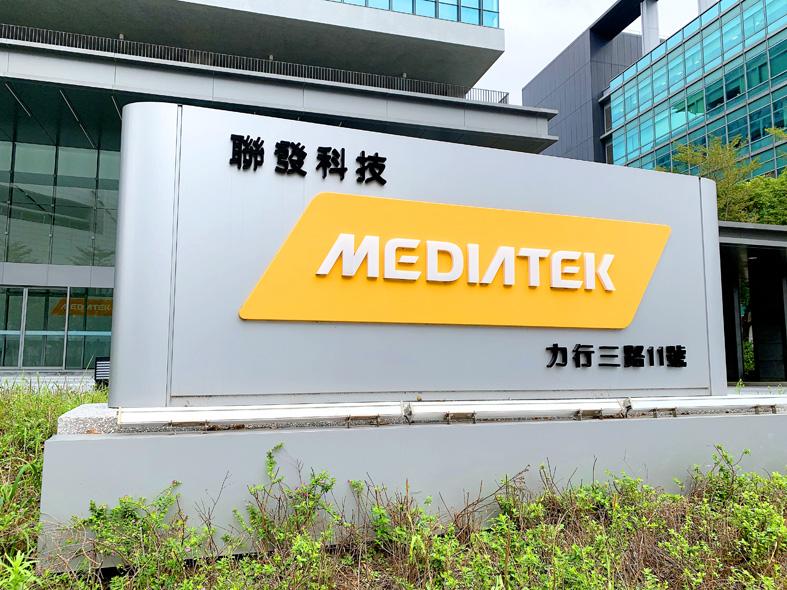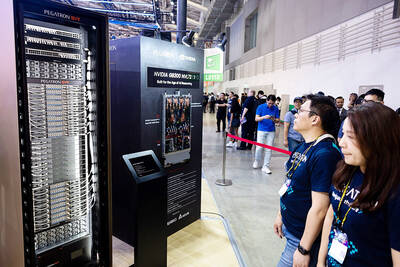MediaTek Inc (聯發科) yesterday said it is testing its 5G chips that support millimeter-wave technology at the company’s research-and-development (R&D) center in Hsinchu in collaboration with Chunghwa Telecom Co (中華電信) to accelerate the rollout of the world’s first chips using the technology.
MediaTek’s announcement came after the world’s largest 5G handset chip supplier built a strong presence in 5G chips using other technologies, driven by chips that support the 6 gigahertz band or lower.
The partnership with Chunghwa Telecom offers favorable conditions for MediaTek to introduce the new 5G chips to the US, Europe and Japan, the companies said in a joint statement.

Photo: Grace Hung, Taipei Times
MediaTek has cooperated with more than 100 telecoms worldwide to certify its 5G chips, it said.
To create the environment needed for testing, Chunghwa Telecom has deployed 5G non-stand-alone mobile networks in MediaTek’s 5G R&D center, utilizing the telecom’s mid-band 3.5 gigahertz and high-band 28 gigahertz bands, the statement said.
MediaTek told investors in January that its millimeter-wave system-on-a-chip has been certified by a major global operator, with mass production scheduled to begin in the second half of this year for the global market.
MediaTek said it expects the worldwide 5G penetration rate to surpass 50 percent this year, compared with slightly more than 35 percent last year.
That means about 700 million 5G smartphones would be shipped this year, up 40 percent from 500 million units last year, the company said.
Separately, MediaTek said it has won priority status to acquire the superficies rights for a 1,736m2 plot in Hsinchu for NT$3.77 billion (US$130.78 million), the company said in a Taiwan Stock Exchange filing yesterday.
The land is owned by the Railway Bureau, it said.
MediaTek was given the right to develop the land near Hsinchu’s high-speed rail station for 70 years, the bureau said in a statement.
The chipmaker plans to spend NT$9 billion on the development project and create 3,000 new jobs, the bureau said.
In a separate statement, MediaTek said it is planning to build an office building at the same site, as that would boost talent acquisition of R&D engineers to support the company’s bullish prospects.
MediaTek plans to hire 2,000 new employees this year, the company said.

AI TALENT: No financial details were released about the deal, in which top Groq executives, including its CEO, would join Nvidia to help advance the technology Nvidia Corp has agreed to a licensing deal with artificial intelligence (AI) start-up Groq, furthering its investments in companies connected to the AI boom and gaining the right to add a new type of technology to its products. The world’s largest publicly traded company has paid for the right to use Groq’s technology and is to integrate its chip design into future products. Some of the start-up’s executives are leaving to join Nvidia to help with that effort, the companies said. Groq would continue as an independent company with a new chief executive, it said on Wednesday in a post on its Web

RESPONSE: The Japanese Ministry of Finance might have to intervene in the currency markets should the yen keep weakening toward the 160 level against the US dollar Japan’s chief currency official yesterday sent a warning on recent foreign exchange moves, after the yen weakened against the US dollar following Friday last week’s Bank of Japan (BOJ) decision. “We’re seeing one-directional, sudden moves especially after last week’s monetary policy meeting, so I’m deeply concerned,” Japanese Vice Finance Minister for International Affairs Atsushi Mimura told reporters. “We’d like to take appropriate responses against excessive moves.” The central bank on Friday raised its benchmark interest rate to the highest in 30 years, but Bank of Japan Governor Kazuo Ueda chose to keep his options open rather than bolster the yen,

Even as the US is embarked on a bitter rivalry with China over the deployment of artificial intelligence (AI), Chinese technology is quietly making inroads into the US market. Despite considerable geopolitical tensions, Chinese open-source AI models are winning over a growing number of programmers and companies in the US. These are different from the closed generative AI models that have become household names — ChatGPT-maker OpenAI or Google’s Gemini — whose inner workings are fiercely protected. In contrast, “open” models offered by many Chinese rivals, from Alibaba (阿里巴巴) to DeepSeek (深度求索), allow programmers to customize parts of the software to suit their

Global server shipments are expected to surge to 15 million units next year, from 4 million units this year, with artificial intelligence (AI) servers accounting for about 30 percent, driven by massive capital spending by major cloud service providers, the Market Intelligence and Consulting Institute (MIC) said on Thursday last week. Major cloud service providers — including Google’s parent company Alphabet Inc, Microsoft Corp, Amazon.com Inc and Meta Platforms Inc — are projected to budget US$450 million for capital expenditure next year, up from US$400 million this year, MIC ICT [information and communications technology] Industry Research Center director Edward Lin